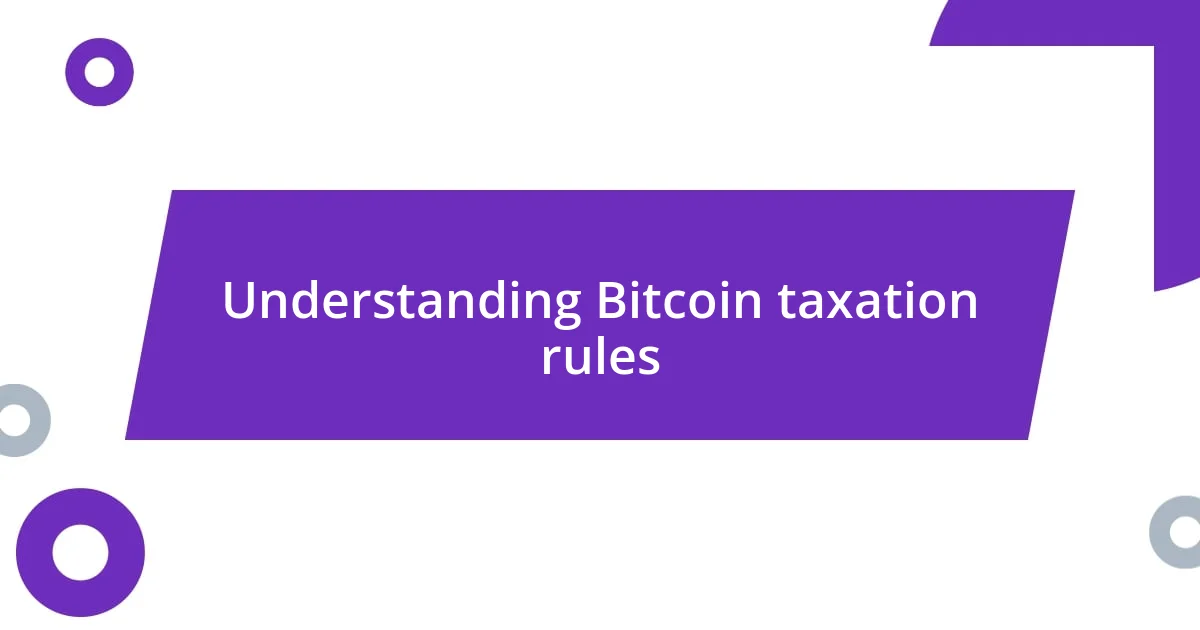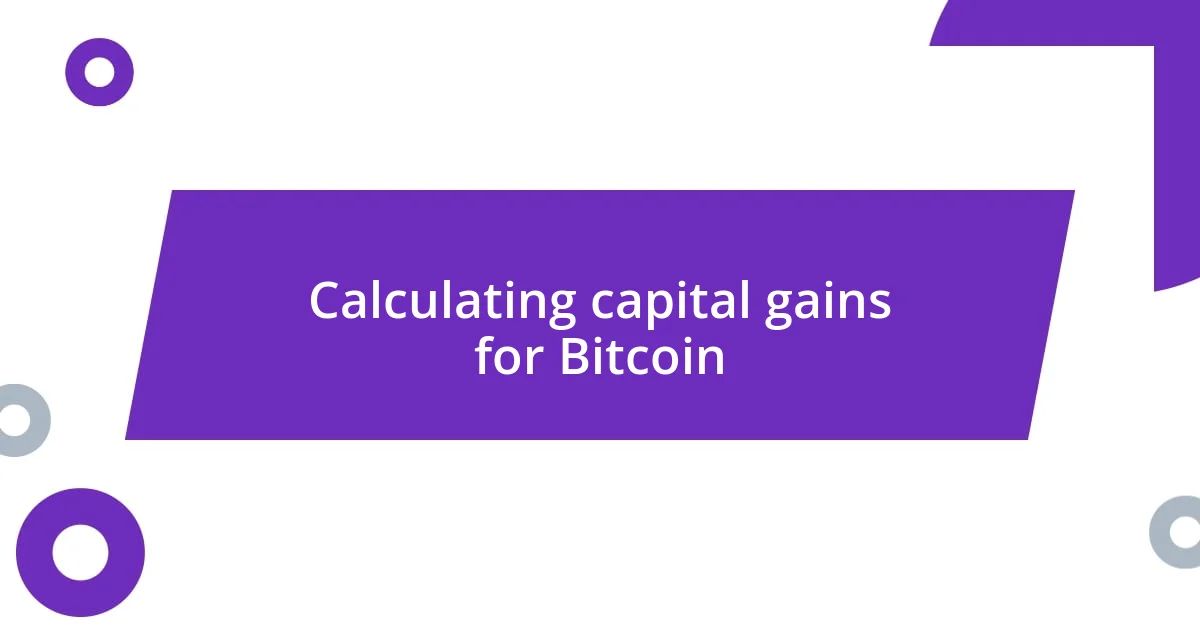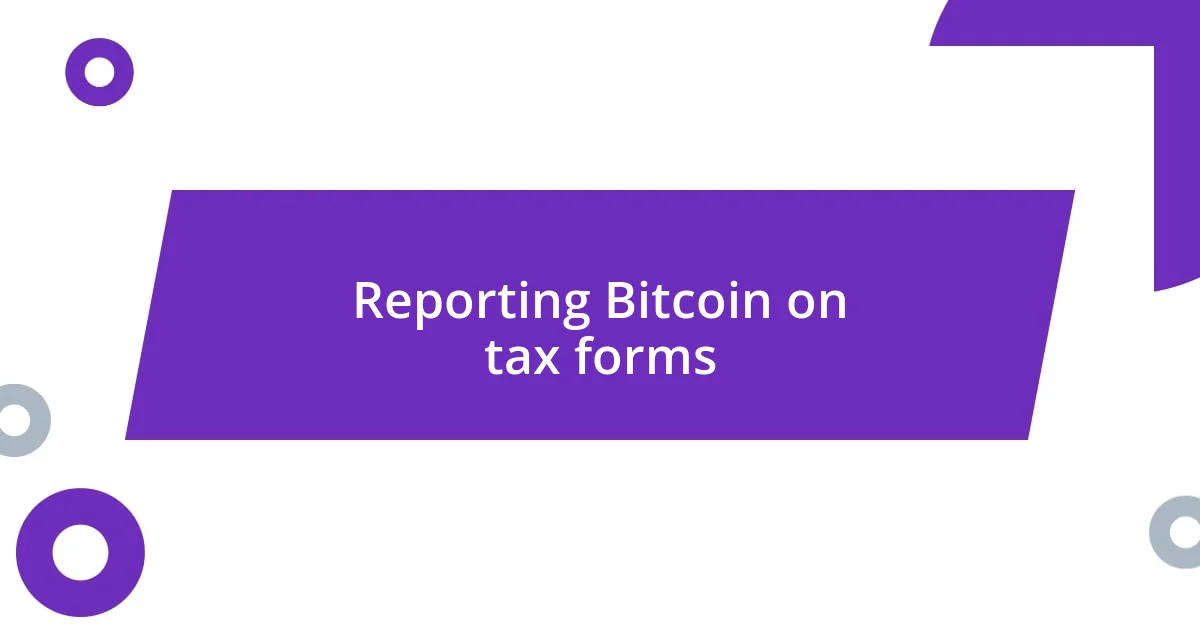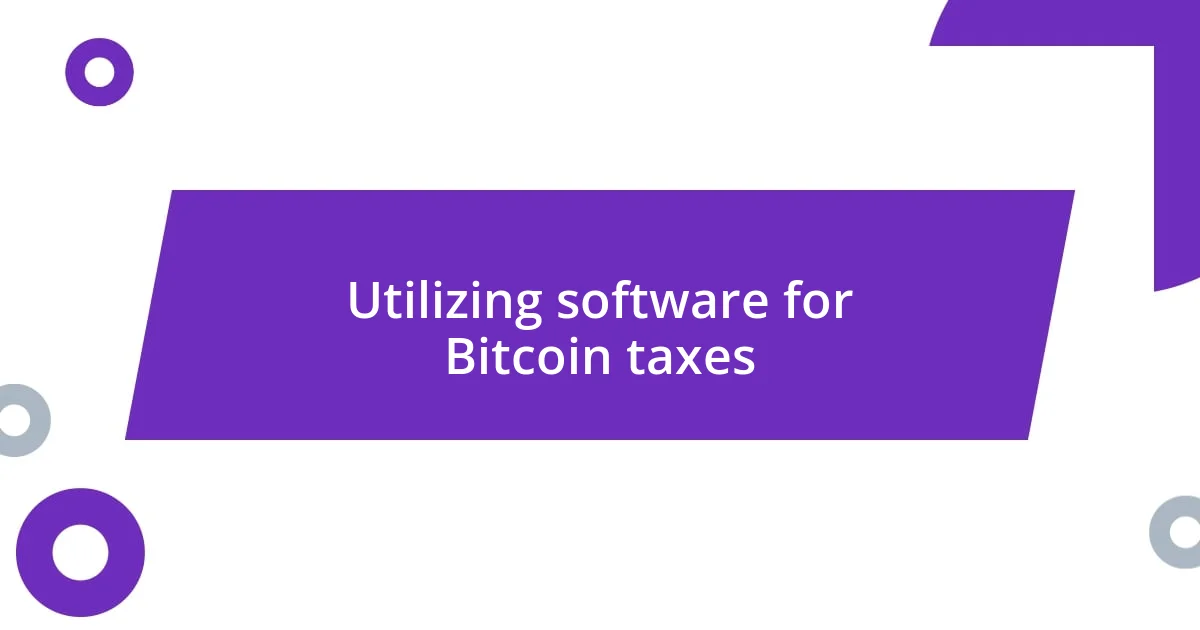Key takeaways:
- Bitcoin is treated as property by the IRS, requiring meticulous record-keeping of transactions, gains, and losses for accurate tax reporting.
- Using specialized cryptocurrency tracking software simplifies transaction management, automates data entry, and integrates directly with exchanges, reducing errors and preparation time.
- Deductions, such as transaction fees and capital losses, can significantly reduce tax liability, while charitable donations in Bitcoin may also qualify for deductions based on fair market value.

Understanding Bitcoin taxation rules
When it comes to understanding Bitcoin taxation rules, it can feel intimidating. I still remember the first time I dived into this topic—it felt like I was trying to decipher a foreign language! In the U.S., the IRS considers Bitcoin and other cryptocurrencies as property, which means that every time you sell or trade Bitcoin, you’re technically realizing a gain or loss. Have you thought about how that impacts your taxes?
Navigating the nuances of these rules requires more than just basic knowledge; I’ve learned that keeping meticulous records of every transaction is crucial. For instance, I used to overlook small transactions thinking they wouldn’t matter. But over time, those small gains added up, catching me off guard during tax season. This experience made me realize that every buy, trade, or sale is part of the overall picture that the IRS expects me to report.
Moreover, understanding the difference between long-term and short-term capital gains can be a game-changer. Short-term gains, which are for assets held for less than a year, are taxed at your ordinary income rate, while long-term gains benefit from lower rates. I remember crunching the numbers and realizing that holding onto my Bitcoin just a bit longer would save me a significant amount come tax time—it’s all about strategy!

Tracking Bitcoin transactions efficiently
Tracking Bitcoin transactions can be quite the undertaking. I often find myself reflecting on past mistakes and the importance of staying organized. There was a time when I simply used a spreadsheet, but I quickly learned how overwhelming that could become, especially with a growing portfolio. Since then, I’ve opted for dedicated cryptocurrency tracking software, which has transformed my experience, making it much easier to manage my transactions efficiently.
I can’t stress enough the value of automatically categorizing transactions. Initially, I manually entered every trade, which was not only time-consuming but also led to errors that complicated my tax filings. By using software that syncs directly with my wallets and exchanges, I’ve been able to eliminate that hassle and focus more on strategy—this integration saves me hours and gives me peace of mind come tax time.
To further streamline my tracking process, I make it a habit to review my transaction records periodically. This practice prevents any last-minute scrambles when tax deadlines approach. I’ve discovered that setting aside a few minutes each week to check my records not only relieves stress but also helps me stay proactive in my tax planning.
| Tracking Method | Pros |
|---|---|
| Manual Spreadsheet | Full control over data, customization options |
| Cryptocurrency Tracking Software | Automation, error reduction, easy integration with wallets |
| Accounting Services | Professional assistance, compliance assurance |

Calculating capital gains for Bitcoin
Calculating capital gains for Bitcoin is an essential part of managing your cryptocurrency taxes. When I first started, figuring out how to determine my gains felt overwhelming. The idea of keeping track of my entry and exit prices for each transaction seemed like a daunting task, but I quickly realized that a systematic approach makes it more manageable. Knowing the exact purchase price—often referred to as the cost basis—allows me to calculate gains accurately and avoid unnecessary tax burdens.
Here are the key steps I follow to calculate capital gains:
- Determine the cost basis: This is the original value of the Bitcoin when I bought it.
- Identify the sale price: This is what I received when I sold or traded the Bitcoin.
- Calculate the gain or loss: Subtract the cost basis from the sale price. If the result is positive, it’s a gain; if it’s negative, it’s a loss.
- Account for transaction fees: It’s crucial to consider any fees that were paid during the transaction since they can affect the overall gain.
- Keep track of holding periods: Understanding whether a gain is short-term or long-term influences the tax rate applied.
Sometimes, I encounter scenarios where I’ve used Bitcoin for purchases rather than selling it for cash. This can complicate calculations further, as I need to treat the transaction as if I sold my Bitcoin at fair market value at that time. These situations have taught me to remain diligent, as unexpected tax implications can arise from these transactions, and they underscore the importance of thorough record-keeping.

Reporting Bitcoin on tax forms
When it comes to reporting Bitcoin on tax forms, accuracy is critical. I remember the first time I sat down to complete my tax return, staring at the forms like they were in a foreign language. Understanding that cryptocurrencies are treated as property for tax purposes meant I had to report gains and losses just like I would for stocks or real estate. This revelation shifted my entire approach to tax reporting.
Each year, I carefully review my records before diving into the forms. I’ve found that using Form 8949 is essential for reporting my Bitcoin transactions. It provides a structured way to list each sale, including the date acquired, date sold, proceeds, and cost basis. Honestly, the first time I filled it out, I felt a mix of anxiety and determination. Was I making a mistake? With the guidance I had gathered, though, it became a valuable tool that helped me document my trades effectively.
What’s even more critical is keeping track of the various exchanges and wallets I’ve used, as each can impact how and where I report transactions. I often jot down notes about any nuances, like what to remember for next year’s filing. Have you ever faced confusion with multiple wallets? It can be a tangled web, but I learned to stay organized from the start. This habit saves me from unnecessary headaches—and potentially costly errors—when it’s time to report.

Deductions and credits for Bitcoin
Deductions related to Bitcoin might not be front of mind, but they can significantly impact my tax liability. I remember a time when I discovered that transaction fees incurred during buying or selling Bitcoin are deductible. It felt like finding hidden treasure! Each time I sell or trade, I meticulously track those costs because they can reduce my overall taxable income, making my tax bill lighter.
Another avenue I explore is the treatment of losses from Bitcoin investments. If I sell Bitcoin for less than what I paid, I can report that as a capital loss, which helps offset any gains I might have realized from other investments. This aspect of loss deduction was a game-changer for me, especially during years when the market was particularly volatile. Have you ever had a bad trading year? Knowing I could potentially soften the financial blow through losses gave me some peace of mind as I navigated through those turbulent times.
It’s also worth mentioning that charitable contributions made in Bitcoin may qualify for deductions based on its fair market value at the time of the donation. I was surprised to learn that gifting Bitcoin not only allows me to support causes I care about, but it also offers a chance for a tax deduction. It’s a win-win! Have you considered how your Bitcoin donations might affect your tax situation? It’s definitely a thought worth exploring!

Utilizing software for Bitcoin taxes
When I first started tracking my Bitcoin transactions, I quickly realized that manually calculating gains and losses was a daunting task. That’s when I turned to specialized software designed for cryptocurrency tax reporting. I still remember the relief I felt as I watched the software generate detailed reports, breaking down my trades and providing the information I needed for my tax forms. Have you ever felt overwhelmed by numbers? Using this software felt like having a personal accountant guiding me through the process.
Another benefit I discovered is how these tools sync automatically with various exchanges and wallets. This feature saves me countless hours I once spent digging through past transactions. I recall a weekend spent looking for a specific transaction from months ago—what a headache! Now, with a few clicks, everything is neatly organized, allowing me to focus on my investment strategy rather than on record-keeping. Isn’t it nice when technology helps streamline our workload?
I’ve also found that many of these software options offer features beyond just tax preparation. They provide insights into my trading patterns and highlight potential areas for improvement. I nearly did a double take when I saw a chart that revealed my biggest losses. It made me reflect on my trading strategy and consider adjustments for the upcoming year. Have you taken the time to analyze your trading performance? Using these tools has truly transformed how I view my investments and their tax implications.














